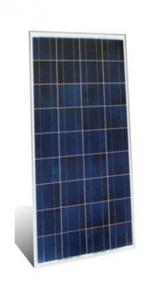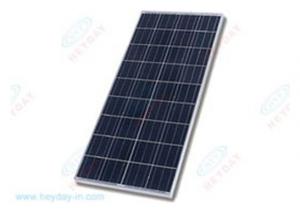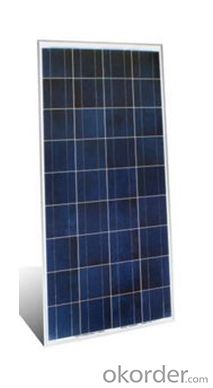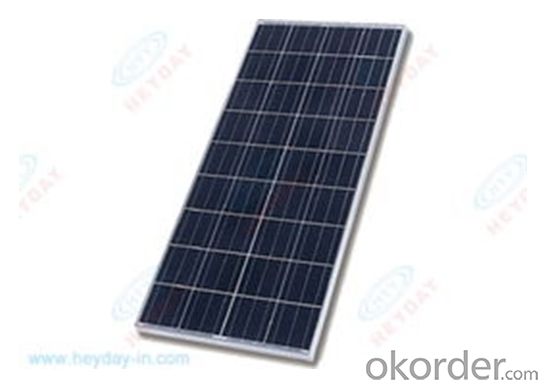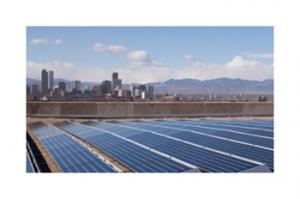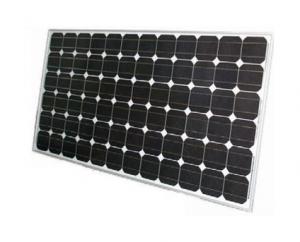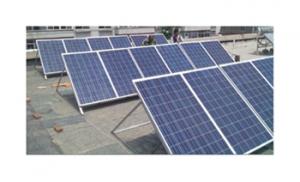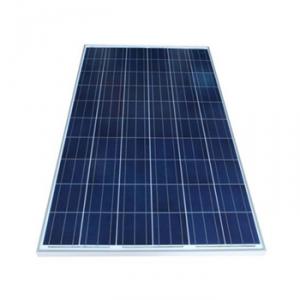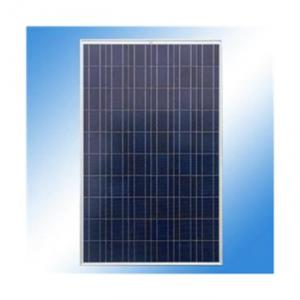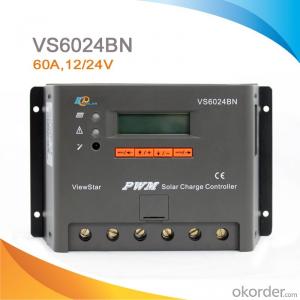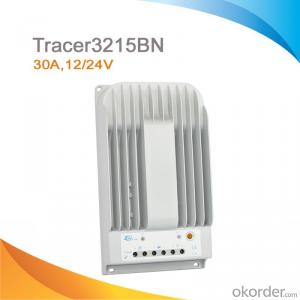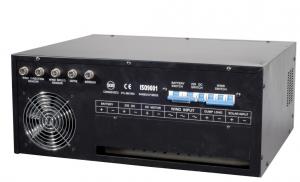Mppt Solar Controllers Compatible Poly-Crystalline 130W 156*156 Solar Modules
OKorder Service Pledge
OKorder Financial Service
You Might Also Like
Solar Module Descriptions:
Solar Power Modules (known as Photovoltaics - PV) can generate electricity for your home or business, either as part of a stand-alone solar power system, or for buildings already connected to the local electricity network.
Customers benefit from our progressive system innovations. Around the world, we meet our customers' desire for the greatest possible reliability, long-term performance and aesthetic integration. No matter which kind of roof – we always have the right solution.
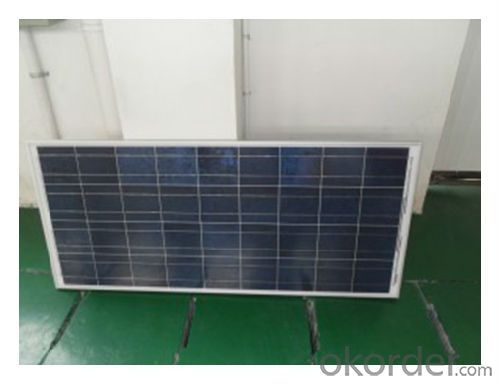
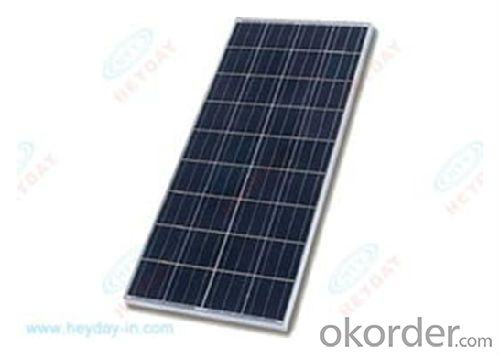
Electrical Characteristics
Max-power (W) | 130 |
Max-Power Voltage (V) | 17.9 |
Max-Power Current (A) | 7.30 |
Open-Circuit Voltage (V) | 21.74 |
Short-Circuit Current (A) | 8.05 |
Mechanical Characteristics
Cable type, Diameter and Length | 4mm2, TUV certified, 1000mm |
Type of Connector | Compatible with MC4 plug |
Arrangement of cells | 4*9 |
Cell Size | 156*156 |
Dimension | 1482*676*40 |
Weight | 12Kg |
Glass, Type and Thickness | High Transmission, Low Iron, Tempered Glass 3.2mm |
Features
Guaranteed positive tolerance 0/+5w ensures power output reliability
Strong aluminum frames module can bear snow loads up to 5400Pa and wind loads up to 2400Pa.
Excellent performance under low light environments (mornings evenings and cloudy days)
12 years for product defects in materials and workmanship and 25 years for 80% of warranted minimum power.
Certifications and standards: IEC 61215.
Manufactured according to International Quality and Environment Management System (ISO9001, ISO14100).
FAQ
Q: Do you have any MOQ limit?
Our MOQ is 200 pieces.
Q: How long is the warranty period for the solar modules?
15 years 90% of its nominal power rating.
25 years 80% of its nominal power rating
- Q: Can a solar controller be used with a solar-powered biomass plant?
- No, a solar controller cannot be used with a solar-powered biomass plant. A solar controller is designed specifically for regulating and optimizing the performance of solar panels and batteries. It is not compatible with the unique requirements and systems of a solar-powered biomass plant, which involves the conversion of organic matter into energy through combustion or other processes. Different control systems and mechanisms are needed to effectively manage and control the biomass plant's operations.
- Q: How does a solar controller handle the protection against high voltage transients?
- A solar controller handles protection against high voltage transients by using various methods. One common approach is the use of surge protection devices, such as metal oxide varistors (MOVs), which can absorb and redirect excess voltage away from sensitive components. Additionally, some solar controllers incorporate built-in voltage regulation circuits to prevent voltage spikes from reaching critical components. These protective measures help safeguard the solar controller and connected devices from potential damage caused by high voltage transients.
- Q: Can a solar controller be used with any type of solar panel?
- No, a solar controller cannot be used with any type of solar panel. The compatibility between the solar controller and the solar panel depends on various factors such as the voltage and current ratings of the panel, as well as the type of technology used in the panel (e.g., monocrystalline, polycrystalline, or thin-film). It is important to ensure that the solar controller is compatible with the specific characteristics of the solar panel to ensure optimal performance and safety.
- Q: What is the maximum charging voltage a solar controller can provide?
- The maximum charging voltage a solar controller can provide typically depends on the specific model and its design. However, the range is commonly between 13.8 to 14.8 volts for a 12-volt system and 27.6 to 29.6 volts for a 24-volt system.
- Q: Can a solar controller be used with solar panel bypass diodes?
- Yes, a solar controller can be used with solar panel bypass diodes. In fact, it is recommended to use a solar controller in conjunction with bypass diodes to ensure optimal performance and protection of the solar panel system. The solar controller helps regulate the charging process and prevent overcharging, while the bypass diodes help minimize the effect of shading or partial shading on the solar panel's output.
- Q: Can a solar controller be used with solar panels that are mounted on a ground-mounted structure?
- Yes, a solar controller can be used with solar panels that are mounted on a ground-mounted structure. The solar controller is responsible for regulating the charging and discharging of the batteries connected to the solar panels. Whether the panels are mounted on a rooftop or a ground-mounted structure, the solar controller can effectively manage the power generated by the panels and ensure optimal performance and battery life.
- Q: How do you set up and program a solar controller?
- To set up and program a solar controller, you need to follow a few key steps. First, connect the solar panel to the controller's solar input terminals. Then, connect the battery to the controller's battery terminals. Make sure you have the correct voltage settings for both the solar panel and battery. Next, connect any load or device you want to power with the controller to its load terminals. Once the physical setup is complete, refer to the controller's manual to understand its programming options. This typically involves navigating through the controller's menu using buttons or a display interface to set parameters such as battery type, charging voltage, load control, and other settings. Adjust these settings according to your specific requirements and preferences. It is important to consult the controller's manual and understand its unique features and programming options to ensure optimal performance and efficiency.
- Q: What is the maximum charging voltage that a solar controller can provide?
- The specific model and manufacturer's specifications determine the maximum charging voltage that a solar controller can provide. Generally, for a 12-volt system, most solar controllers have a maximum charging voltage of approximately 14.4 to 14.8 volts, while for a 24-volt system, it is around 28.8 to 29.6 volts. To determine the exact maximum charging voltage for the specific solar controller being used, it is crucial to consult the manufacturer's guidelines and specifications. Going beyond the recommended maximum charging voltage may result in potential damage to the batteries or other components connected to the solar system.
- Q: What is the maximum power rating that a solar controller can handle?
- The maximum power rating that a solar controller can handle varies depending on its specific model and design. However, in general, solar controllers are capable of handling power ratings ranging from a few hundred watts to several kilowatts.
- Q: Are all solar controllers compatible with all types of batteries?
- No, not all solar controllers are compatible with all types of batteries. Different types of batteries have different charging and discharging characteristics, and as a result, require specific charging algorithms and voltage settings. Therefore, it is important to ensure that the solar controller is compatible with the type of battery being used to optimize charging performance and avoid potential damage.
Send your message to us
Mppt Solar Controllers Compatible Poly-Crystalline 130W 156*156 Solar Modules
OKorder Service Pledge
OKorder Financial Service
Similar products
Hot products
Hot Searches
Related keywords
